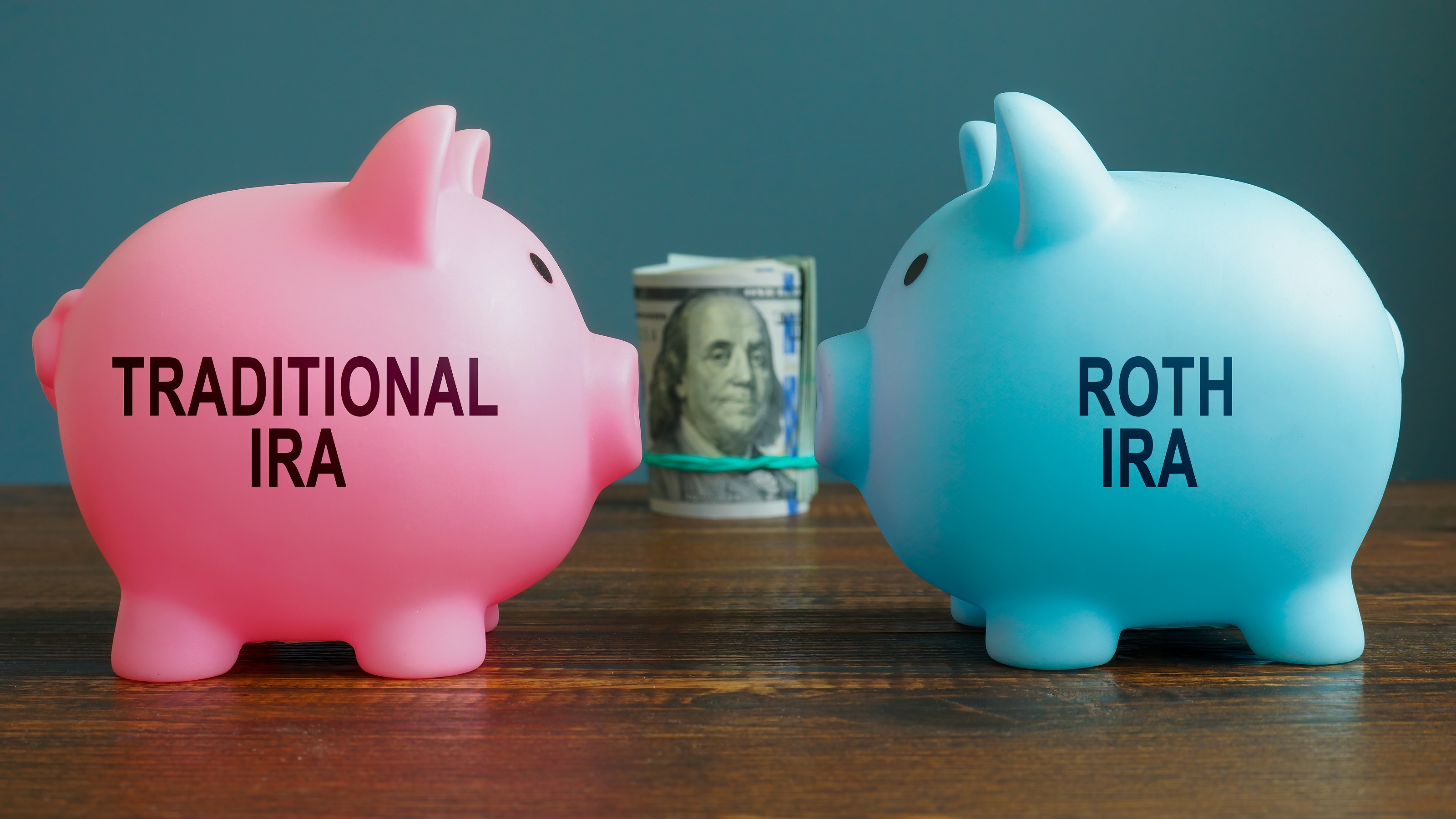Benefits of Doing Roth IRA Conversions Early in Retirement
Retirees could cut their lifetime tax burden as well as minimize taxes’ impact on the long-term wealth of their heirs.


Profit and prosper with the best of Kiplinger's advice on investing, taxes, retirement, personal finance and much more. Delivered daily. Enter your email in the box and click Sign Me Up.
You are now subscribed
Your newsletter sign-up was successful
Want to add more newsletters?

Delivered daily
Kiplinger Today
Profit and prosper with the best of Kiplinger's advice on investing, taxes, retirement, personal finance and much more delivered daily. Smart money moves start here.

Sent five days a week
Kiplinger A Step Ahead
Get practical help to make better financial decisions in your everyday life, from spending to savings on top deals.

Delivered daily
Kiplinger Closing Bell
Get today's biggest financial and investing headlines delivered to your inbox every day the U.S. stock market is open.

Sent twice a week
Kiplinger Adviser Intel
Financial pros across the country share best practices and fresh tactics to preserve and grow your wealth.

Delivered weekly
Kiplinger Tax Tips
Trim your federal and state tax bills with practical tax-planning and tax-cutting strategies.

Sent twice a week
Kiplinger Retirement Tips
Your twice-a-week guide to planning and enjoying a financially secure and richly rewarding retirement

Sent bimonthly.
Kiplinger Adviser Angle
Insights for advisers, wealth managers and other financial professionals.

Sent twice a week
Kiplinger Investing Weekly
Your twice-a-week roundup of promising stocks, funds, companies and industries you should consider, ones you should avoid, and why.

Sent weekly for six weeks
Kiplinger Invest for Retirement
Your step-by-step six-part series on how to invest for retirement, from devising a successful strategy to exactly which investments to choose.
So, you’ve worked hard throughout your career, saved for retirement and now the light at the end of the tunnel is becoming larger and brighter. It’s pretty simple — freedom and independence are just around the corner, and a big retirement account balance means nothing to worry about and no further work to do, right?
Well, in fact, the winding down of your career is only the end of one stage of the wealth creation journey. It benefits new or potential retirees to consider the roles of tax — and not just within a single tax year, but over a multiyear horizon. When we consider the tax burden from a lifetime perspective, the objective becomes less about paying less each year and more about paying less in total. This leads us to different decision points, decisions that may not seem immediately intuitive, but which can have a major impact on our long-term wealth and that of our heirs.
Often when working with clients who are nearing retirement, it is clear from their balance sheet that the forced savings mechanism of their workplace retirement plan has allowed them to accumulate a significant amount in relation to their other savings. While technically they’ve done the right thing over many decades, it is important to highlight possible issues on the horizon. Large retirement account balances may equal large tax bills in the future. The money was contributed pre-tax, grew and compounded in an environment with no tax drag, and so now it’s reasonable that the government would want to start taking their cut, having incentivized us to prepare for this stage of life.
From just $107.88 $24.99 for Kiplinger Personal Finance
Become a smarter, better informed investor. Subscribe from just $107.88 $24.99, plus get up to 4 Special Issues

Sign up for Kiplinger’s Free Newsletters
Profit and prosper with the best of expert advice on investing, taxes, retirement, personal finance and more - straight to your e-mail.
Profit and prosper with the best of expert advice - straight to your e-mail.
Many retirees assume their days of being in a high income tax bracket may be behind them, but required minimum distributions (RMDs) mean they will have to realize a certain amount of ordinary income from the IRA annually, and this coupled with Social Security, pensions and any other income they may have can put them back into a similarly high tax bracket as when they were still working.
Consider converting retirement assets to Roth IRAs
Many retirees in this situation can benefit from considering converting some retirement assets into a Roth IRA in the early years of retirement. The Roth IRA differs from the traditional tax-deferred IRA in that it is an after-tax account. All the tax was paid before the contributions were made, so any distributions taken out are tax-free. Because of this, the government has no required distributions, so the funds can stay in the account and continue to grow over time. This also means there will be less required taxable income.
A Roth conversion has the impact of realizing ordinary income as the funds are withdrawn from the traditional IRA, so this isn’t a slam dunk for everyone, but in years when income is low (retired, no RMDs or Social security yet), a certain amount of conversion can be executed very “cheaply” (i.e., within the lower tax brackets).
One of the key elements here is whether the resulting tax bill can be funded from existing after-tax assets. If the Roth conversion tax needs to be satisfied from the amount converted, then it takes a lot longer for the effort to “break even,” as we are investing less into the Roth account to compound tax-free.
A key element is flexibility
In recent years, legislative changes have steadily delayed RMDs to age 73, and eventually to age 75. It may seem counterintuitive to applaud this change, while simultaneously advocating for clients to take assets out of their tax-deferred IRAs before they’re required to. The key element here is flexibility. Being able to control the timing and the amount of the distribution (or conversion) can greatly assist with managing the lifetime tax bill.
Aside from minimizing required distributions during your own lifetime, another advantage of Roth IRAs is from an estate planning perspective. Under recent legislation, the non-spousal beneficiary of an IRA is required to distribute the entire account within a 10-year time frame. Many of us could be in our peak earning years at the time our parents pass away, and so we’re already in a high tax bracket. While such inheritance may seem like “found money,” it is quite inefficient from a tax perspective. Contrast this with Roth IRAs, which have no such requirements and the taxes have already been paid.
Again, it pays to think of our tax obligation beyond the narrow confines of a given tax year and extend that perspective beyond ourselves and consider the tax burden on our heirs.
Bear in mind that the optimal path differs for everyone. Consider a situation where you have no heirs. A Roth conversion is a little less attractive, as that estate planning benefit may not be as important to you. Yes, the asset would continue to grow tax-free post-conversion, but perhaps the dominant issue on your balance sheet is a lack of post-tax savings (bank or brokerage account). Taking the distributions while other income is low and building up that post-cash cushion is prudent in the years before Social Security and RMDs kick in.
The recent bout of inflation has left us with wider tax brackets, and it is important to note these. It isn’t the end of the world to move into the next tax bracket, but each dollar withdrawn or converted becomes incrementally more expensive, and there are two particularly large jumps in the tax brackets to keep an eye on (12% to 22%, and 24% to 32%). Note also that tax brackets are driven by taxable income, and IRMAA (Medicare premium) rates are driven by modified adjusted gross income. These numbers can be quite different from each other, so it’s key to pay attention to both, as the increase in monthly Medicare premiums can offset the long-term benefit from the conversion.
Charitable giving can help, too
For investors who are right on the upper edge of a tax or IRMAA bracket, all is not lost. If charitably inclined, gifting stocks with high unrealized gains (preferably) to a donor-advised fund or gifting part of an RMD from the IRA will help reduce income and provide more room for a Roth conversion.
Since the doubling of the standard deduction with the 2017 Tax Cuts and Jobs Act, it is more common to see people bundling or doubling their charitable giving in one year, then skipping the following year. Any plan to convert or withdraw excess from the IRA should align with those gifting plans.
Many retirees have more levers to pull than perhaps they realize. There are too many variables in each of our lives for one standard solution, but some of the universal factors to start thinking about are: retirement age, Social Security withdrawal age, estate plan priorities and intentions, and ratio of tax-deferred retirement assets to other liquid assets.
The bottom line is that retirement is a stage of life just like going to college or having children. It can make a big difference to have a well-thought-out plan for how to optimally fund those golden years.
Taxes are as certain as death, but the tax code is there to be understood and optimized. It behooves everyone to fully understand the rules of the game.
The information provided herein is for illustrative and educational purposes only and is not intended to be and does not constitute specific investment advice. We urge you to consult with a qualified advisor before making any investment decisions.
Information contained herein has been obtained from sources believed to be reliable. While we have no reason to doubt its accuracy, we make no representations or guarantees as to its accuracy. The opinions and analyses expressed herein constitute judgments as of the date of this publication and are subject to change at any time without notice. Any decisions you make based upon any information contained in this publication or otherwise are your sole responsibility.
Specific securities mentioned are used as examples for illustrative purposes only and should not be construed as a recommendation. Further, it should not be assumed that investments in the securities identified and discussed were or will be profitable. Past performance does not guarantee future results. All investments involve risks including the loss of principal. Employees and related persons of FBB Capital Partners may, and in some instances do, hold positions or other interests in the securities mentioned herein.
Any forward-looking statements or projections herein are based on assumptions. By their nature, forward-looking statements involve a number of risks, uncertainties and assumptions that could cause actual results or events to differ materially from those expressed or implied by the forward-looking statements. You should not place undue reliance on forward-looking statements, which reflect our judgment only as of the date this information was published.
FBB Capital Partners, LLC (FBB) is a SEC-registered investment advisor located in Bethesda, Maryland. Additional information, including our services, advisory fees and other helpful disclosures, can be found in our Form ADV Part 2, which is available upon request or on the SEC's website at www.adviserinfo.sec.gov.
Profit and prosper with the best of Kiplinger's advice on investing, taxes, retirement, personal finance and much more. Delivered daily. Enter your email in the box and click Sign Me Up.

Mel brings nearly two decades of financial services and investing experience to the FBB Capital Partners team. As a Senior Portfolio Manager, Mel is responsible for managing client relationships and client investment portfolios. A native of Dublin, Ireland, Mel received his Bachelor of Commerce degree from University College Dublin. He is a CFA® and CAIA charterholder, a member of the CFA Institute and a member of the CFA Society of Washington, DC. Mel lives in Bethesda, Maryland, with his wife, Jenny, and their two children.
-
 Quiz: Do You Know How to Avoid the "Medigap Trap?"
Quiz: Do You Know How to Avoid the "Medigap Trap?"Quiz Test your basic knowledge of the "Medigap Trap" in our quick quiz.
-
 5 Top Tax-Efficient Mutual Funds for Smarter Investing
5 Top Tax-Efficient Mutual Funds for Smarter InvestingMutual funds are many things, but "tax-friendly" usually isn't one of them. These are the exceptions.
-
 AI Sparks Existential Crisis for Software Stocks
AI Sparks Existential Crisis for Software StocksThe Kiplinger Letter Fears that SaaS subscription software could be rendered obsolete by artificial intelligence make investors jittery.
-
 Social Security Break-Even Math Is Helpful, But Don't Let It Dictate When You'll File
Social Security Break-Even Math Is Helpful, But Don't Let It Dictate When You'll FileYour Social Security break-even age tells you how long you'd need to live for delaying to pay off, but shouldn't be the sole basis for deciding when to claim.
-
 I'm an Opportunity Zone Pro: This Is How to Deliver Roth-Like Tax-Free Growth (Without Contribution Limits)
I'm an Opportunity Zone Pro: This Is How to Deliver Roth-Like Tax-Free Growth (Without Contribution Limits)Investors who combine Roth IRAs, the gold standard of tax-free savings, with qualified opportunity funds could enjoy decades of tax-free growth.
-
 One of the Most Powerful Wealth-Building Moves a Woman Can Make: A Midcareer Pivot
One of the Most Powerful Wealth-Building Moves a Woman Can Make: A Midcareer PivotIf it feels like you can't sustain what you're doing for the next 20 years, it's time for an honest look at what's draining you and what energizes you.
-
 I'm a Wealth Adviser Obsessed With Mahjong: Here Are 8 Ways It Can Teach Us How to Manage Our Money
I'm a Wealth Adviser Obsessed With Mahjong: Here Are 8 Ways It Can Teach Us How to Manage Our MoneyThis increasingly popular Chinese game can teach us not only how to help manage our money but also how important it is to connect with other people.
-
 Looking for a Financial Book That Won't Put Your Young Adult to Sleep? This One Makes 'Cents'
Looking for a Financial Book That Won't Put Your Young Adult to Sleep? This One Makes 'Cents'"Wealth Your Way" by Cosmo DeStefano offers a highly accessible guide for young adults and their parents on building wealth through simple, consistent habits.
-
 Global Uncertainty Has Investors Running Scared: This Is How Advisers Can Reassure Them
Global Uncertainty Has Investors Running Scared: This Is How Advisers Can Reassure ThemHow can advisers reassure clients nervous about their plans in an increasingly complex and rapidly changing world? This conversational framework provides the key.
-
 I'm a Real Estate Investing Pro: This Is How to Use 1031 Exchanges to Scale Up Your Real Estate Empire
I'm a Real Estate Investing Pro: This Is How to Use 1031 Exchanges to Scale Up Your Real Estate EmpireSmall rental properties can be excellent investments, but you can use 1031 exchanges to transition to commercial real estate for bigger wealth-building.
-
 Should You Jump on the Roth Conversion Bandwagon? A Financial Adviser Weighs In
Should You Jump on the Roth Conversion Bandwagon? A Financial Adviser Weighs InRoth conversions are all the rage, but what works well for one household can cause financial strain for another. This is what you should consider before moving ahead.